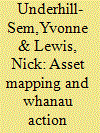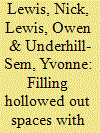|
|
|
Sort Order |
|
|
|
Items / Page
|
|
|
|
|
|
|
| Srl | Item |
| 1 |
ID:
083847


|
|
|
|
|
| Publication |
2008.
|
| Summary/Abstract |
Te Runanga o Te Rarawa is the tribal council representing the interests of the marae (tribal commons) and hapu (a subtribal kin group) that make up the iwi (a Maori tribe) of Te Rarawa in the far north of Aotearoa/New Zealand. In April 2005, officials approached us to help them secure a valuable funding stream tagged to marshalling resources for material development in the area. They sought curriculum vitae and assistance in reframing the funding specifications. Intrigued, armed with a conceptual toolkit drawn from Gibson-Graham's ideas of post-development and asset-based community mapping, and confident that we could add value, we agreed to help. This paper examines the complex politics of our involvement and our changing positioning as researcher subjects. We argue that negotiating a politics of knowledge for projects of this nature requires engagement in complex representational politics of place and divisive identity politics that rage around it. There are no easy protocols for outside researchers, but with appropriate humility and sensitivity to these politics, we can rely on, and should stand up for, the value of our work, which lies in commitments to excellence in scholarship. We cannot and should not seek to control these politics, which will chew us up and spit us out - humanely and with good grace or otherwise. However, good academic work will recognise and adapt to them. In our particular case, we argue that our work had significant value; and in this paper, we trace the production of this value
|
|
|
|
|
|
|
|
|
|
|
|
|
|
|
|
| 2 |
ID:
134164


|
|
|
|
|
| Publication |
2014.
|
| Summary/Abstract |
Over the last decade, international education initiatives and higher education restructuring in various parts of the world have been increasingly entangled with national knowledge economy policy and urban growth projects. The ensuing entanglements have been more or less 'policied' by what might be termed 'educity imaginaries', which have taken spectacular material form in some global cities. In this paper, we explore the working out of educity imaginaries in Auckland against the backdrop of shifting investment trajectories and the global mobility of educity policy. We argue that globalising imaginaries have intersected with local policy legacies and political economy to produce a mix of mundane and promissory imaginaries. We examine the frictions generated in these encounters and the ways in which they are reworked as resources in local city-making. Working from a commitment to enactive research, we argue that Auckland City might make much more of the possibilities opened up by 'educity imaginaries'.
|
|
|
|
|
|
|
|
|
|
|
|
|
|
|
|
| 3 |
ID:
090016


|
|
|
|
|
| Publication |
2009.
|
| Summary/Abstract |
The contracting out to private providers of services previously delivered within the state has been framed critically as 'hollowing out' and read for its erosion of social democracy, social justice and welfare, as well as its inefficiencies in practice. It is commonly dismissed as neoliberalism. In this paper, we highlight the gains made through this new contractualism by Te Oranga, the Family, Health and Education division of Te Runanga o Te Rarawa located in the Far North of New Zealand. Our aim is not to narrate the exceptional, but to point to the inherent resistances to totalising projects residing in agency and place. Placed at the service of a deep sense of community being and community good rather than self-interest, delivery contracts have enabled Te Oranga to pursue an alternative form of local development and craft a set of progressive spaces. Although highly contingent upon powerful Maori political projects, we argue that the case suggests that gains may be sought in other settings, albeit partial, temporary, and politically contingent. We thus offer a more nuanced account of neoliberalism by highlighting its agency, fractures, politics, and contradictions, and by demonstrating that actualised neoliberalisms are co-constituted with other political projects.
|
|
|
|
|
|
|
|
|
|
|
|
|
|
|
|
| 4 |
ID:
090006


|
|
|
|
|
| Publication |
2009.
|
| Summary/Abstract |
At a time when neoliberalism is held by critical geographers to be responsible for global financial crisis and a new, neoconservative government with strong neoliberal elements is reforming tertiary education in New Zealand, it might appear suicidal for a geographer to be editing a special section on progressive social spaces of Neoliberalism in Asia Pacific Viewpoint.
|
|
|
|
|
|
|
|
|
|
|
|
|
|
|
|
|
|
|
|
|